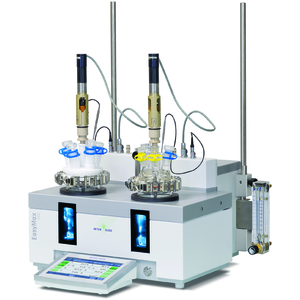EasyMax 402 Thermostat System
The Personal Synthesis Workstation.EasyMax 402 Advanced Synthesis Workstation for Chemical and Process Development
For Engineers and Chemists
The personal workstation allows chemists and engineers to develop new synthetic routes, increase development speed and produce first material batches.
High Quality Process Control and Data
The EasyMax 402 Advanced allows precise parameter control and records high-quality process data providing key information of chemical reactions.
Wide Temperature Range
The EasyMax 402 enables experiments in a temperature range from -40 to 180 °C without the use of cumbersome oil and ice baths, or bulky cryostats.
Material No.: 30084210

| Temperature Range | -40 °C – 180 °C |
| Operating Volume | 40 mL – 400 mL |
| Material | Powder-coated stainless steel with FEP coated cover plate |
| Dimensions (HxWxD) | 28 cm x 43 cm x 36 cm |
| Back / Front light | Yes/No |
| Weight | 20 kg |
| Power Requirements | 100 – 240 VAC, 50/60Hz |
| Heating / Cooling | Solid State Thermostat |
| Temperature Modes | Jacket control, reaction mixture control, distillation control, crystallization control |
Best User Experience
Operated via an easy-to-use touchscreen, reaction parameters can be controlled and data and trends displayed. A task sequence programmed on the touchscreen enables unattended operation. The optional, intuitive iControl PC software allows more complex recipes.
Broad Application Range and Flexibility
The EasyMax 402 Advanced lets you control a broad range of reaction parameters such as temperature, pH, stirring speed, or reagent addition with high precision. One- and two-piece reactors support working volumes from 40 to 400 mL.
Data Management Solutions
All experimental data is recorded automatically, and it can be evaluated further and exported into other applications. The server-based iC Data Center enables central data storage, automatic report generation and provides data for further analysis and visualization.
Integration of Calorimetry and PAT
Seamless integration of process analytical technology or calorimetric information significantly enhances understanding of the progress of the reaction, its potential risks and the formation of by-products.
